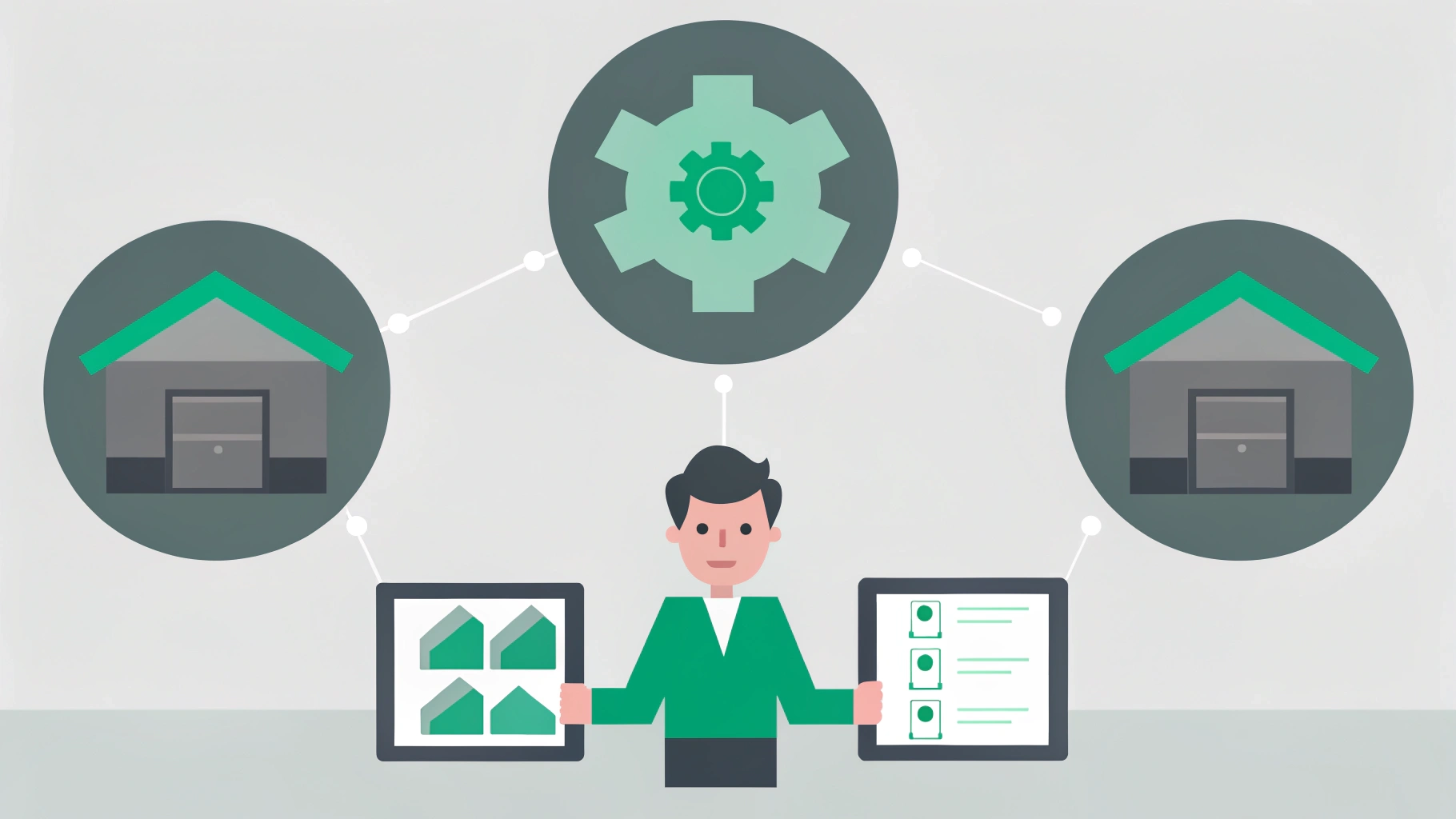Overview
The most effective ERP solutions for distributors are meticulously crafted to boost operational efficiency. They incorporate essential features such as:
- Real-time stock management
- Automated order processing
- Integrated reporting tools
Notably, systems like 10X ERP not only streamline processes but also enhance decision-making capabilities. These solutions deliver substantial advantages, including:
- Lower operational costs
- Heightened customer satisfaction
In today’s rapidly evolving distribution landscape, they are indispensable for overcoming modern challenges.
Introduction
In the fast-paced world of distribution, operational efficiency is not merely a goal; it is an absolute necessity. As businesses navigate the complexities of supply chain management, the significance of Enterprise Resource Planning (ERP) systems grows increasingly vital. This article explores the premier ERP solutions specifically designed for distributors, emphasizing essential features that can enhance productivity and streamline operations. However, with a plethora of options available, how can distributors pinpoint the right ERP system that not only fulfills their current requirements but also adapts to future challenges?
Defining ERP: What It Means for Distributors
(ERP) is considered the best ERP solution as it represents a critical advancement in integrated software solutions, strategically designed to manage and automate essential business processes across various departments within an organization. For suppliers, ERP systems are indispensable in optimizing operations by seamlessly integrating functions such as:
- Stock management
- Order processing
- Accounting
- Customer relationship management
into a unified platform. This integration not only facilitates real-time data access but is also crucial for informed decision-making in today’s dynamic distribution landscape.
Recent trends highlight that 53% of organizations prioritize the best ERP as a key investment, especially in the distribution sector, where operational efficiency is non-negotiable. By leveraging cloud technology, contemporary ERP systems like 10X ERP empower suppliers with the flexibility and scalability required to adapt to shifting market demands, ultimately enhancing productivity and operational efficiency. Furthermore, organizations that implement AI-enabled ERP systems report an impressive 20% improvement in forecasting accuracy and a 15% reduction in operational costs. This underscores the transformative potential of these solutions within the distribution industry, establishing them as the best ERP for forward-thinking businesses, making them not just an option but a necessity.
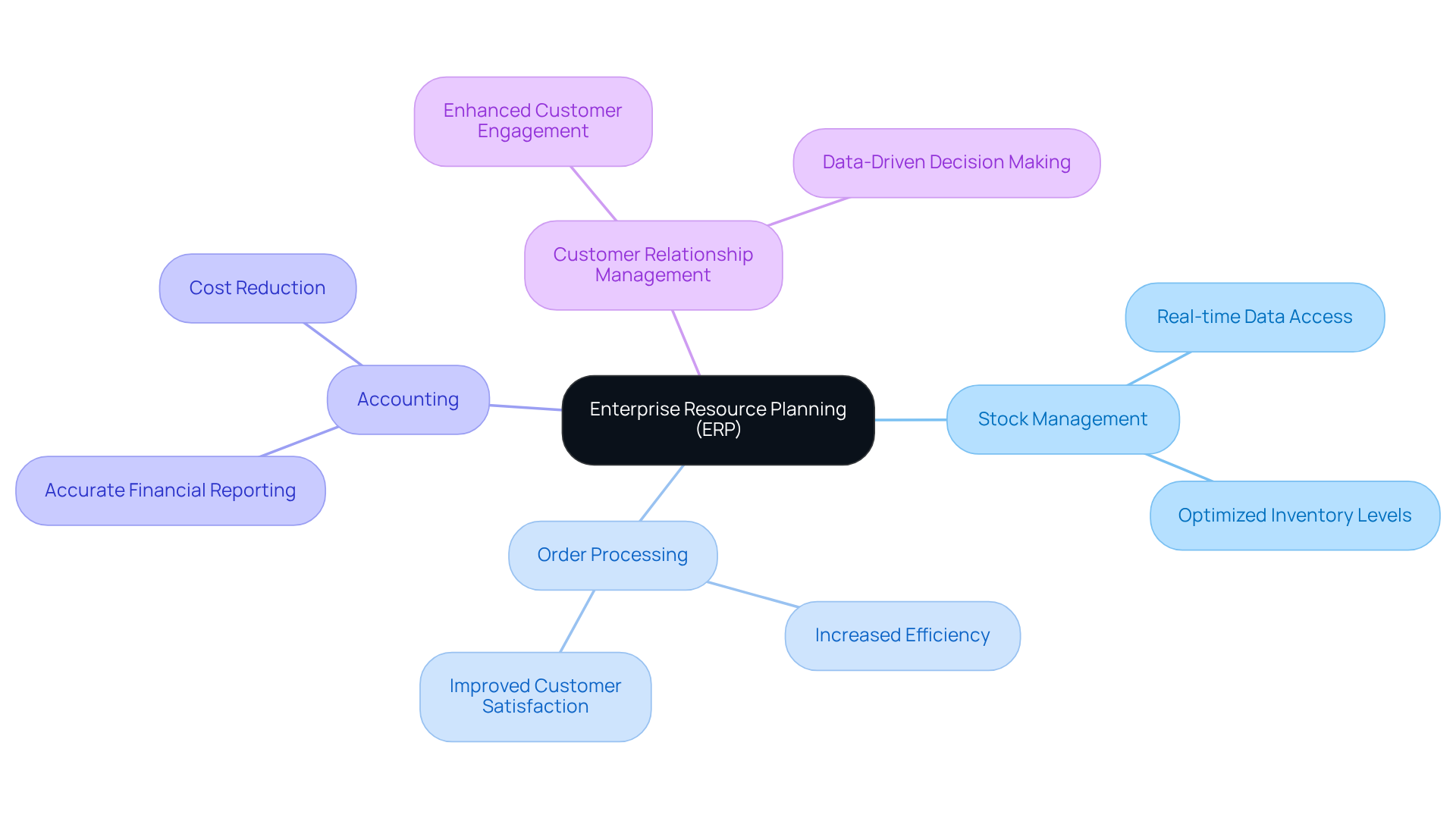
Challenges Faced by Distributors and the Need for ERP Solutions
Distributors face a multitude of challenges, including the complexities of managing intricate supply chains, maintaining accurate stock levels, and ensuring timely order fulfillment. Such challenges can lead to inefficiencies, increased operational costs, and diminished customer satisfaction. For instance, the absence of a centralized system often results in data silos, causing miscommunication and errors among departments. Data indicates that over 60% of suppliers struggle to gain real-time insights into stock levels and demand trends, exacerbating these issues.
, such as 10X ERP, effectively address these challenges by providing a unified platform that enhances visibility across the supply chain, automates routine tasks, and fosters improved collaboration among teams. With its comprehensive cloud-based features, 10X ERP stands out as the best ERP, delivering best-in-class inventory management, real-time data processing, and seamless integrations—essential elements in today’s competitive landscape where responsiveness and accuracy are crucial for success. Moreover, 10X ERP offers a transparent pricing model and a complete software bundle, ensuring suppliers understand the value they receive as they grow.
Industry leaders highlight that the integration of the best ERP systems has transformed operations, significantly enhancing efficiency and decision-making processes. Michael Dautner asserts, “ERP systems have undoubtedly revolutionized the food distribution industry, significantly improving efficiency and effectiveness across the supply chain.” Real-life examples illustrate that suppliers without ERP systems often grapple with manual processes, leading to costly mistakes and missed opportunities. For example, a supplier that implemented 10X ERP reported a 30% reduction in order fulfillment time and a 25% increase in stock accuracy. By adopting 10X ERP, suppliers can streamline processes, enhance stock oversight, and ultimately boost customer satisfaction.
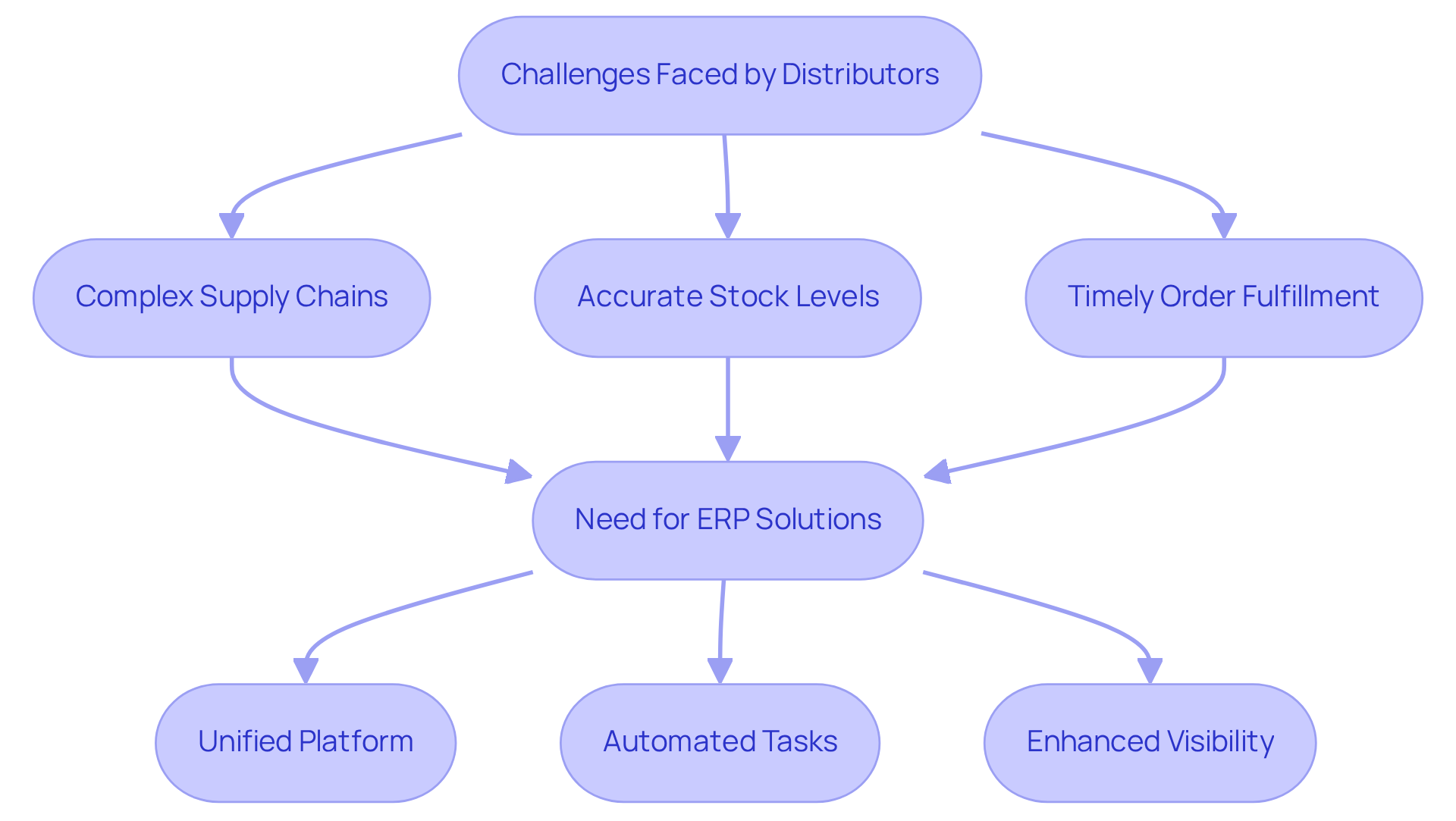
Essential Features of ERP Systems for Distributors
Key aspects of the best ERP systems tailored for wholesalers encompass real-time stock oversight, order processing automation, and sophisticated reporting functionalities. The cloud-based nature of the best ERP enhances these features, delivering robust security and scalability. Real-time stock management is crucial, as it empowers suppliers to maintain precise stock levels, significantly reducing the risk of shortages that can lead to missed sales, as well as excess situations that inflate holding costs. Statistics indicate that companies utilizing real-time data for stock decisions can achieve a 20% reduction in total expenses, underscoring its importance.
Order processing automation further boosts operational efficiency by streamlining fulfillment processes, resulting in quicker response times and enhanced customer satisfaction. Companies that adopt automated systems, such as the [best ERP solutions provided by 10X ERP](https://10xerp.com/why-10x), report a 30% increase in order fulfillment rates, showcasing the tangible advantages of this technology.
Moreover, extensive reporting tools are vital for offering insights into sales trends, stock turnover, and financial performance, enabling distributors to make informed, data-driven decisions. Additional features like customer relationship management (CRM) integration, demand forecasting, and mobile accessibility are also crucial, as they foster a more agile and responsive distribution operation. For example, businesses utilizing can optimize inventory levels, thereby reducing carrying costs and enhancing cash flow.
Case studies reveal that suppliers implementing these ERP features experience improved operational agility, allowing them to respond swiftly to market changes and customer demands. As the distribution landscape continues to evolve, leveraging the best ERP capabilities will become increasingly essential for maintaining competitiveness and driving growth. For further information on support and implementation processes, please consult our user manuals and FAQs.
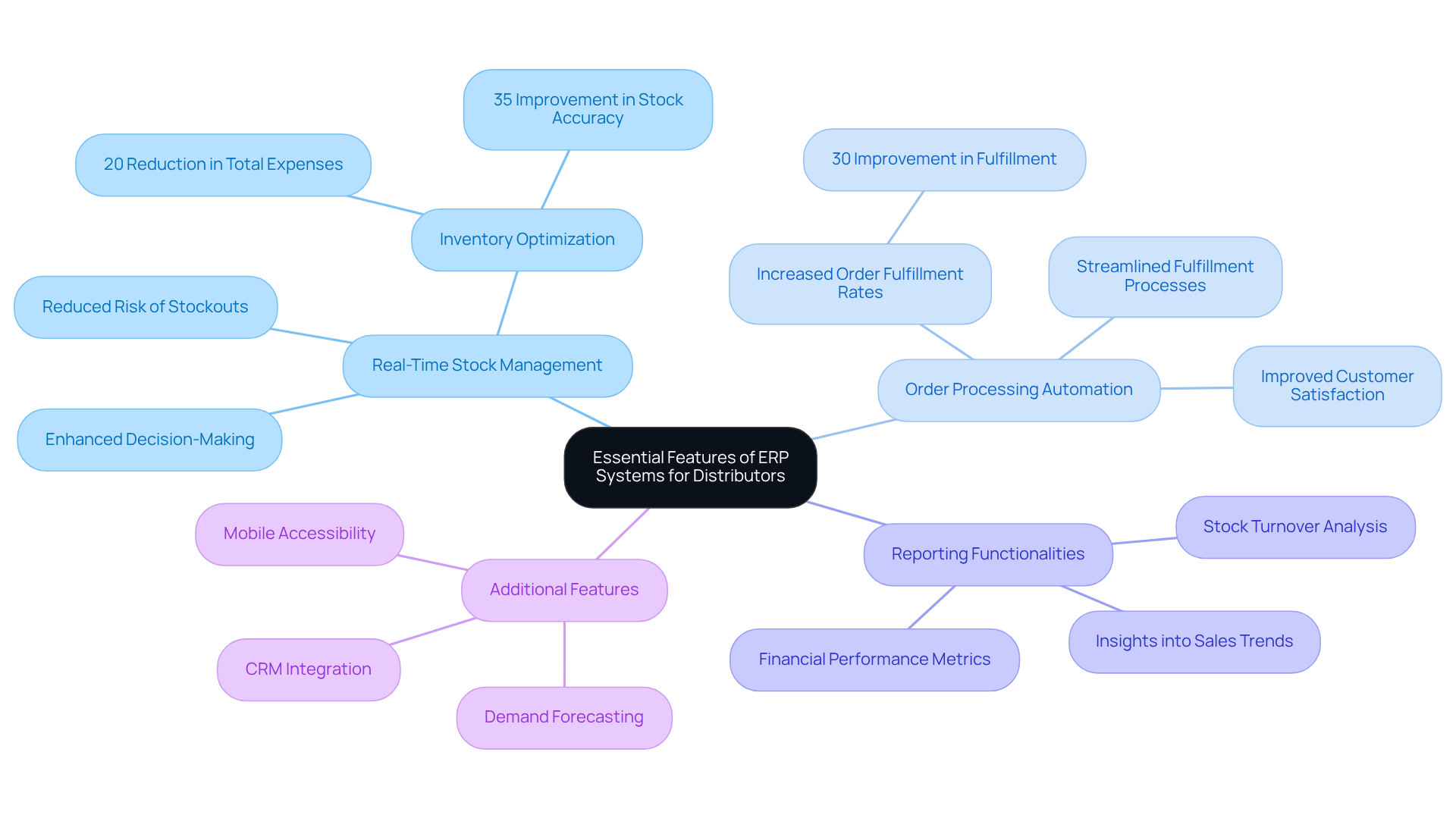
Top ERP Solutions for Distributors: A Comparative Analysis
When selecting the best ERP, suppliers have a plethora of top options to evaluate. 10X ERP stands out due to its user-friendly interface and robust inventory control features, making it particularly suitable for expanding suppliers. Its strengths include:
- Real-time data processing
- Seamless app integrations
- An all-inclusive pricing model that encompasses all functionalities and features, thereby eliminating hidden costs
This not only enhances operational efficiency but also boosts customer satisfaction. Furthermore, 10X ERP provides a money-back guarantee, instilling confidence in its value as businesses scale.
In contrast, SAP S/4HANA is tailored for larger enterprises that demand extensive customization and advanced analytics capabilities, rendering it ideal for complex distribution environments. Meanwhile, Oracle NetSuite is recognized for its comprehensive financial administration features, catering to companies that prioritize financial oversight alongside operational management.
A comparative analysis reveals that 10X ERP is favored for its swift onboarding process and transparent pricing, appealing to smaller suppliers in search of economical solutions. Conversely, SAP S/4HANA’s scalability and sophisticated analytics make it the preferred choice for larger organizations aiming to harness data for strategic decision-making. Oracle NetSuite, with its extensive financial tools, is often selected by suppliers looking to integrate financial management with their operational processes.
Significantly, 67% of suppliers and manufacturers characterize their ERP implementations as successful, underscoring the effectiveness of these solutions. By thoroughly evaluating these systems, distributors can pinpoint the best ERP that fits their operational needs and strategic objectives, ensuring they select that aligns with their growth trajectory and business aspirations.
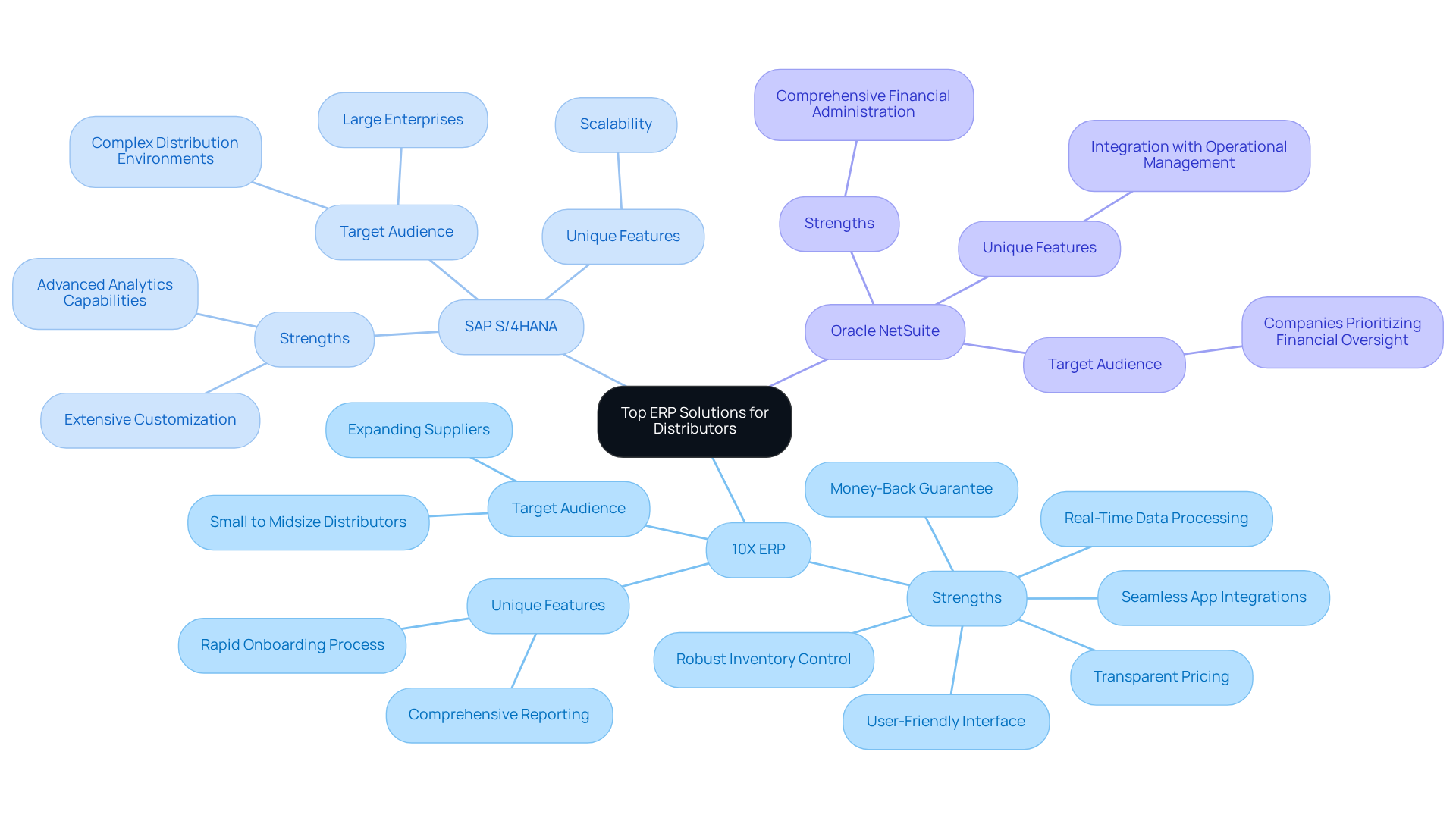
Conclusion
The significance of ERP solutions for distributors is paramount; they are the backbone of operational efficiency and strategic decision-making. By integrating essential business functions into a cohesive platform, ERP systems like 10X ERP not only streamline processes but also empower suppliers to navigate the complexities of modern distribution with agility and precision.
Key points highlighted throughout the article include the critical roles that real-time data access, automation, and comprehensive reporting play in enhancing supply chain visibility and responsiveness. The challenges faced by distributors—such as managing intricate supply chains and ensuring timely order fulfillment—are effectively addressed by the best ERP solutions. These solutions provide a unified approach that fosters collaboration and reduces operational costs. Furthermore, the comparative analysis of top ERP systems emphasizes the importance of selecting a solution that aligns with specific operational needs and growth objectives.
Ultimately, the adoption of robust ERP systems is essential for distributors aiming to thrive in an increasingly competitive landscape. As the distribution sector evolves, leveraging the capabilities of advanced ERP solutions will not only enhance operational efficiency but also drive long-term growth and customer satisfaction. Embracing these technologies is not merely a strategic choice; it is a fundamental necessity for any distributor looking to succeed in the dynamic market of 2025 and beyond.
Frequently Asked Questions
What is ERP and its significance for distributors?
Enterprise Resource Planning (ERP) is an integrated software solution designed to manage and automate essential business processes across various departments within an organization. For distributors, ERP systems are critical for optimizing operations by integrating functions such as stock management, order processing, accounting, and customer relationship management into a unified platform.
How does ERP benefit organizations in the distribution sector?
ERP systems facilitate real-time data access, which is crucial for informed decision-making. They enhance operational efficiency, allowing organizations to adapt to market demands, ultimately improving productivity and reducing operational costs.
What recent trends are observed regarding ERP investments?
Recent trends indicate that 53% of organizations prioritize investing in the best ERP solutions, particularly in the distribution sector where operational efficiency is essential.
How does cloud technology impact modern ERP systems?
Contemporary ERP systems, like 10X ERP, leverage cloud technology to provide suppliers with flexibility and scalability, enabling them to adapt to changing market demands effectively.
What improvements can organizations expect from AI-enabled ERP systems?
Organizations that implement AI-enabled ERP systems report a 20% improvement in forecasting accuracy and a 15% reduction in operational costs, highlighting the transformative potential of these solutions in the distribution industry.
